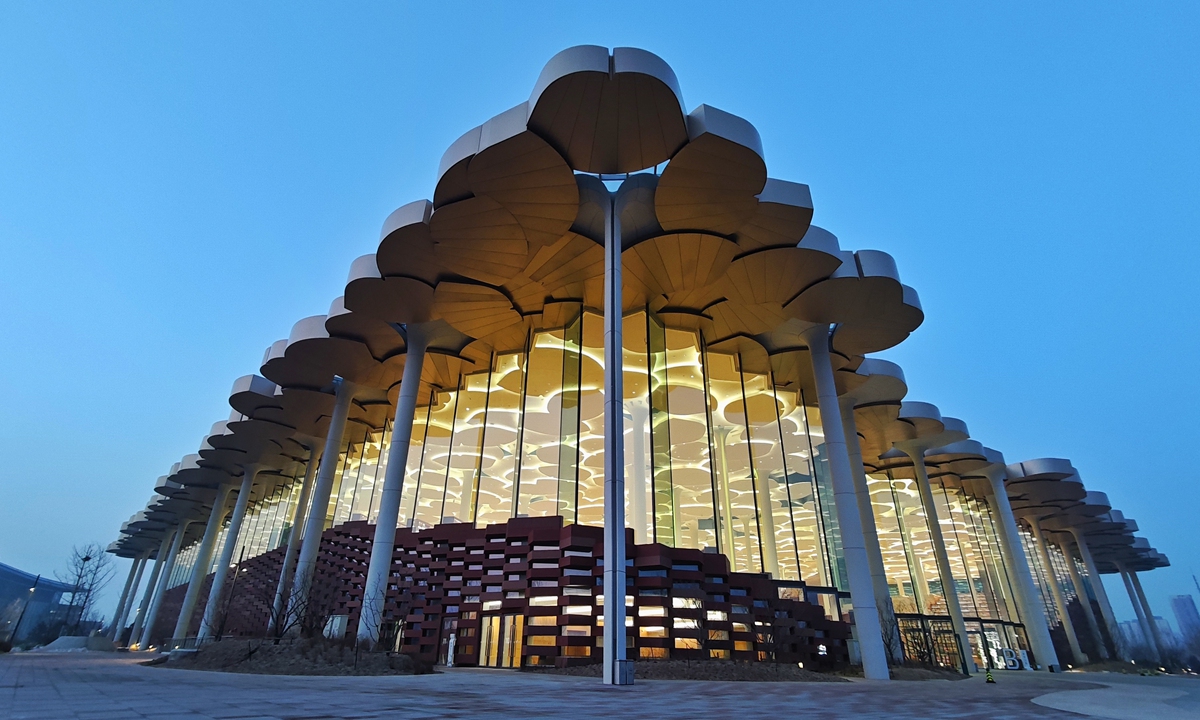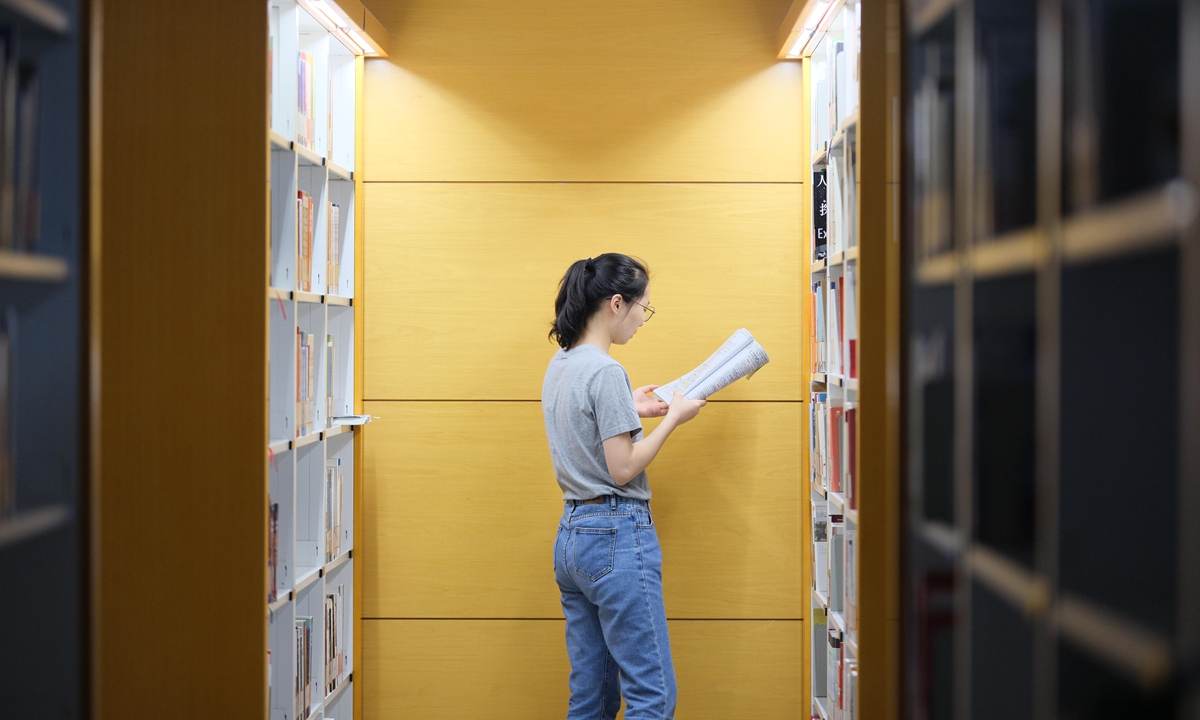
A general view of the Beijing Library Photo: VCG
As the sun sets and the city is enveloped in the peaceful cover of night, a new trend is gaining momentum across China: the 24-hour library. These well-lit havens provide a sanctuary for students, professionals, and anyone in need of a quiet place to read or study in the late hours.
In addition to staying open 24 hours a day, and featuring a wide variety of books, these libraries are equipped with comprehensive study facilities, including water, electricity, power outlets and restrooms. Some even offer beverage service and dining options.
According to a report by state broadcaster CCTV, these libraries remain bustling even on weekday nights. White-collar workers, students attending online classes, and citizens taking a break are regular patrons.
A place for shelterFor Ye, a 25-year-old from Weihai, East China's Shandong Province, the local 24-hour library is an invaluable resource as she is preparing for the civil service exam. Employed full-time, she finds that traditional library hours do not meet her study needs.
"The traditional local libraries usually open at 9 am and close at 10 pm, which isn't convenient for working people like me. I can only immerse myself in study early in the morning or late at night," Ye said.
Ye frequents a 24-hour library in Weihai almost every day during the workweek, staying for two to three hours on each visit. Although the facilities are not as comprehensive - lacking in restrooms and water - she still appreciates the quiet environment.
"The library atmosphere here is very good for studying although there are some people who sleep there or leave books scattered around," she added.
Similarly, Ma, a 20-year-old sophomore from East China's Anhui Province, often visits a 24-hour library in Huai'an.
During long holidays such as the summer and winter vacations, she goes there almost every day, staying for up to nine hours each time to study subjects like computer science, English, and law, according to Ma.
"This library is very quiet as many people are studying. It motivates me," Ma noted, although she admitted that occasional noise can be a distraction.
A social media user surnamed Luo often visits a 24-hour library in Beijing's Xicheng district.
"The place is packed with more people reading than working, and others preparing for exams. The atmosphere is quite peaceful," Luo told the Global Times.
"There's a noticeable increase in visitors at night, including seniors with children and professionals, but most go there to read. It feels quite relaxing. Now, besides cafes, there's another place for me to go after work in the evening," Luo added.

A woman reads in a library in Nantong, East China's Jiangsu Province, on August 12, 2024. Photo: VCG
For the publicAt a library in Beijing's central business district, many office workers gather to read and relax after work. The space provides a serene environment where they can unwind with a good book.
The library is the result of a collaboration between the Chaoyang District Library and a local bookstore, aiming to make borrowing and returning books more convenient, and cultivate a reading habit among local residents with high-quality reading spaces.
Tian Zhuangzhuang, a staffer at the library, told the Global Times on Tuesday that readers have access to over 5,800 books across various categories, including economics and management, biographies, social sciences, and literature.
Readers can borrow and return books using the self-service machine.
The library is also equipped with a book sterilizer to ensure a safe and healthy reading experience.
"We also have a dedicated children's reading section, which was particularly popular with young readers during their summer holidays. We regularly invite authors to host seminars where they share their insights and experiences with readers," Tian said.
The Beijing Library, a new addition to the Capital Library of China (CLCN) located in the capital's Tongzhou district, Beijing's sub-center, is one of many 24-hour libraries to spring up across the country.
Since it was opened in December 2023, the library's 24-hour zone has attracted nearly 35,000 readers between 8 pm and midnight alone.
Zhang Fa, a publicity officer with the CLCN, told the Global Times on Monday that establishing a 24-hour library zone was driven by the intention to "provide greater access to resources for the public."
The 24-hour zone, housing a collection of 12,000 books, is equipped with advanced facilities, including smart desks, self-service checkout systems and accessible restrooms.
"This initiative aims to serve readers who may have difficulty visiting the library during regular hours to ensure that library services are more inclusive and accessible," said Zhang.
"By offering services even when the main library is closed, the 24-hour zone better caters to the diverse needs of different readers, fulfilling the library's mission to promote literacy and knowledge within the community."
The surge in 24-hour libraries reflects the growing enthusiasm for reading among Chinese citizens.
According to a national reading survey in April, the average Chinese adult read 4.75 physical books and 3.40 e-books in 2023.
Public libraries, city reading rooms and bookstores are all contributing to this trend with public libraries earning the highest satisfaction rate among urban residents.
As of the end of 2023, China boasted 3,246 public libraries with a total collection of 1.44 billion books, marking a 5.6 percent increase from 2022.
"People's longing for public cultural spaces like museums and libraries reflects the continuous improvement of spiritual and cultural pursuits of our country," Sun Jiashan, an associate researcher at the Central Academy of Culture and Tourism Administration, told the Global Times.
"For them, visiting museums, libraries, and exhibition halls is not just a leisure, but a way of life."





